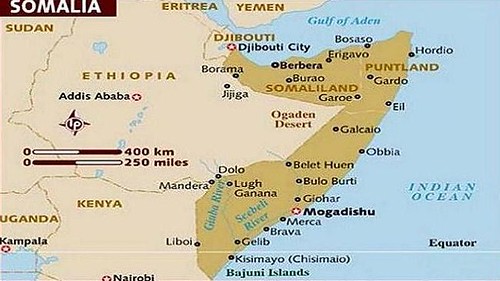
Map of politically fragmented Somalia. Protesters in Somaliland were attacked by police after demonstrating for the further break up of the northern enclave in the Horn of Africa state., a photo by Pan-African News Wire File Photos on Flickr.
Somaliland
The U.S. Recognition of Somalia: Implications and the Way Forward
Monday, 04 February 2013 17:07
Heritage institute Policy Briefing
Somalilandsun
The U.S. recognition of the Somali government on 17 January 2013 is a great and timely opportunity that could contribute to Somalia's effort to retake its rightful place among community of nations.
In the two decades Somalia took hiatus from the international scene, many opportunities that could have helped Somalia shed the 'failed state' designation appeared and vanished with the same speed. Thus, it's up to the Somali government (and citizens) to ensure the U.S. recognition does not turn out, yet again, another squandered opportunity. More importantly, the government must compliment the international diplomatic successes with tangible domestic achievements anchored in the president's six pillar policy.
More broadly, Somalis need to properly understand what, exactly, the U.S. recognition entails, what opportunities it avails as well as what challenges are embedded with it. In doing so, they must be guided by the cardinal truth of international relations; that foreign policy decisions are always made to advance national interests.
From the outset, therefore, the U.S. recognition should be seen as an outcome of strategic calculations, which reflect that it's in the best interest of the United States to recognize Somalia at this particular time. It should not be, under any circumstance, viewed as a favor to the war weary Somalis.
What Somali politicians and citizens should have been euphoric about is NOT the recognition itself - as the case has been - but the fact that that in the eyes of United States, Somalia's fortunes have improved so well that the U.S. government wants to recognize it. Somalis should also be very conscious that interactions between states are entirely a give and take process. It is the responsibility of national leaders to defend nation's interests against those of partners, who at times have more leverages and negotiation powers, as clearly the case currently is between Somalia and the U.S.
Moreover, one missing question that should have piqued the public's curiosity and at the same time generated serious media interest is what has the Somali government give in or give up in exchange for the official U.S. diplomatic recognition. The fact that the recognition coincided with the resignation of Somalia's Special Envoy to the U.S., Abukar Arman, raises more questions about the internal deliberations of the new government.
The departure of the key Somali interlocutor amid the most important recognition in what he described as "misunderstanding" over policy issues is interesting.
That said, the price paid by the Somali government for the recognition was not too steep. However, the absence of any serious discussions about the reality of give-and-take based foreign policy was noticeable.
Understandably, the Somali government was too jubilant about the recognition, but it seemed to have placed high premiums on the symbolisms of president Hassan Sheikh's brief encounter with President Barack Obama. A key challenge now is how to capitalize on the U.S. recognition. This requires putting the issue in context, outlining possible opportunities and drawing attention to potential blind spots.
For the full The U.S. Recognition of Somalia - Policy Briefing. HIPS001/2013. Contact: info@heritageinstitute.org 0r visit www.heritageinstitute.org
No comments:
Post a Comment